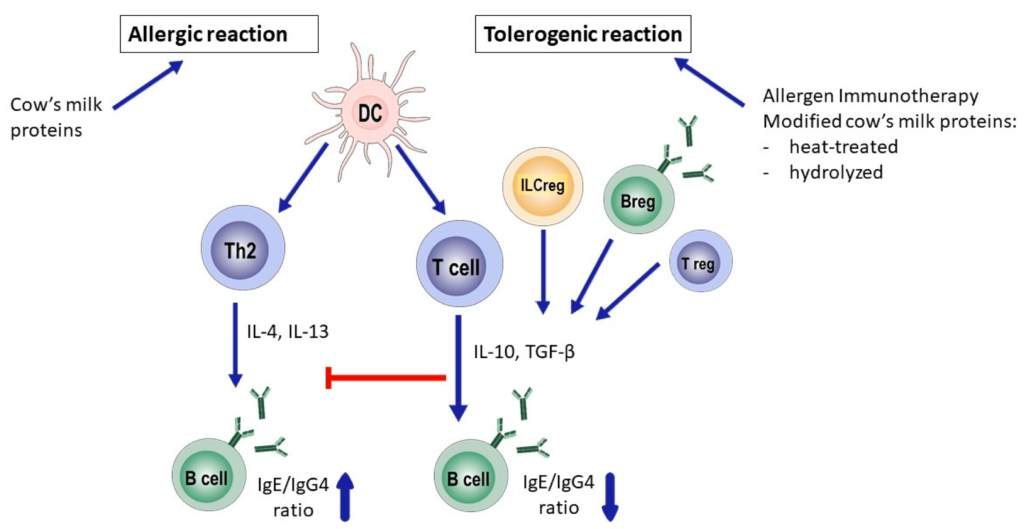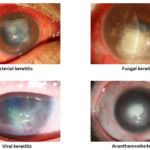Bovine allergy, often referred to as cow’s milk allergy, is an immune-mediated response to proteins found in cow’s milk or bovine-derived products. It is a common condition in both children and adults, though it is more frequently diagnosed in infants and young children.

Proteins Responsible for Allergic Reactions
Bovine allergy is typically triggered by an immune system reaction to specific proteins in cow’s milk, such as:
- Casein: A major protein found in the solid portion of milk.
- Whey: Found in the liquid part of milk after curdling.
The immune system misidentifies these proteins as harmful, leading to the release of histamines and other chemicals.
Risk Factors
Certain factors increase the likelihood of developing :
- Family History: A genetic predisposition to allergies or asthma.
- Age: Most common in infants due to an immature immune system.
- Existing Allergies: Individuals with other allergies may be at higher risk.
Symptoms
Symptoms of bovine allergy can vary in severity and may manifest in multiple systems of the body. Common symptoms include:
Gastrointestinal Symptoms
- Abdominal pain
- Nausea and vomiting
- Diarrhea or loose stools
Respiratory Symptoms
- Nasal congestion
- Wheezing or shortness of breath
- Persistent coughing
Dermatological Symptoms
- Hives (urticaria)
- Eczema
- Itching or swelling of the skin
Severe Reactions
In rare cases, exposure to bovine proteins can cause anaphylaxis, a life-threatening allergic reaction requiring immediate medical attention.
Diagnosing
Medical History and Physical Examination
Doctors typically begin by reviewing the patient’s medical history and performing a physical examination to identify potential triggers and symptoms.
Diagnostic Tests
- Skin Prick Test (SPT): Identifies immediate allergic reactions to bovine proteins.
- Specific IgE Blood Test: Measures levels of antibodies against cow’s milk proteins.
- Oral Food Challenge: Conducted under medical supervision to confirm the diagnosis.
Management and Treatment
Avoidance of Bovine Products
The cornerstone of managing bovine allergy is eliminating exposure to cow’s milk and its derivatives. Common sources to avoid include:
- Milk and dairy products (cheese, butter, yogurt)
- Processed foods containing casein or whey
- Hidden ingredients in baked goods or processed meats
Nutritional Alternatives
Patients must ensure adequate nutrition when avoiding cow’s milk. Alternatives include:
- Plant-based milk (almond, soy, oat, or rice milk)
- Fortified non-dairy products
Medications
- Antihistamines: Used to alleviate mild allergic symptoms.
- Epinephrine: Prescribed for emergency use in case of anaphylaxis.
Bovine Allergy in Infants and Children
Infants diagnosed with bovine allergy often require specialized care. Pediatricians may recommend:
- Hypoallergenic Formulas: Extensively hydrolyzed or amino-acid-based formulas.
- Breastfeeding Modifications: Mothers may need to exclude dairy from their diets if breastfeeding.
Preventing Bovine Allergy
While it is not always possible to prevent bovine allergy, certain measures can reduce the risk:
- Exclusive breastfeeding for the first six months of life.
- Gradual introduction of solid foods, including potential allergens.
- Consulting with a pediatric allergist if there is a family history of allergies.
Its a manageable condition with proper diagnosis, dietary adjustments, and treatment. By understanding the causes, symptoms, and management strategies, individuals with bovine allergy can maintain a healthy and symptom-free life. Early consultation with healthcare professionals is crucial for effective management.

